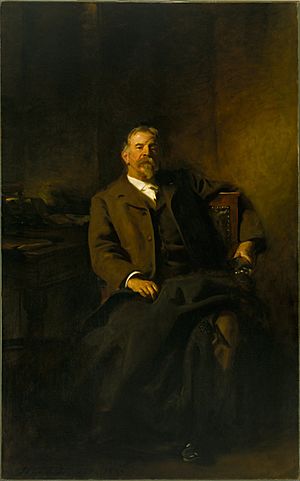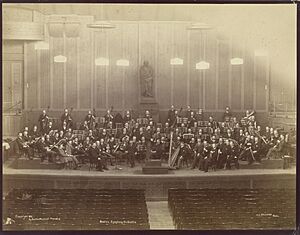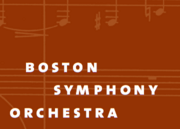Boston Symphony Orchestra facts for kids
Quick facts for kids Boston Symphony Orchestra |
|
|---|---|
| Orchestra | |
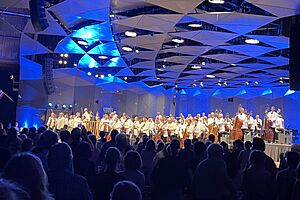
The BSO at the opening concert of the 2023 Tanglewood season
|
|
| Short name | BSO |
| Founded | 1881 |
| Location | 301 Massachusetts Avenue, Boston, Massachusetts, U.S. |
| Concert hall | Symphony Hall Tanglewood |
| Music director | Andris Nelsons |
The Boston Symphony Orchestra (BSO) is a famous American orchestra based in Boston. It is one of the oldest and most important symphony orchestras in the United States. The BSO was started by Henry Lee Higginson in 1881.
The orchestra plays most of its concerts at Symphony Hall in Boston. In the summer, they perform at Tanglewood, a beautiful outdoor venue. Many talented music directors have led the BSO over the years. These include Serge Koussevitzky, Pierre Monteux, and Seiji Ozawa. Today, Andris Nelsons is the music director. The BSO has made many recordings since 1917. They have even played music for movies like Schindler's List.
Contents
The BSO's Journey: A Look at Its History
How the BSO Began
The Boston Symphony Orchestra was founded in 1881 by Henry Lee Higginson. He wanted to create a world-class orchestra in Boston. The first conductor was George Henschel. He was a great singer and conductor. The BSO's very first concert was on October 22, 1881. They played music by famous composers like Ludwig van Beethoven and Joseph Haydn.
Many early conductors of the BSO came from Europe. This was because Higginson wanted the orchestra to have a European sound. One important early conductor was Arthur Nikisch. Another was Wilhelm Gericke, who led the orchestra twice.
Challenges During Wartime
During World War I, the conductor Karl Muck faced a difficult time. He was falsely accused of not playing the American national anthem. Even though the orchestra always played it later, Muck was arrested. He was held in a camp without a trial. After the war, he was sent to Denmark. Muck felt very insulted and never performed in America again.
After Muck, two French conductors led the BSO. Henri Rabaud was there for one season. Then Pierre Monteux took over from 1919 to 1924. Monteux made big changes to the orchestra. He hired many new musicians. This helped create the "French" sound that the BSO is still known for today.
The Koussevitzky and Munch Eras
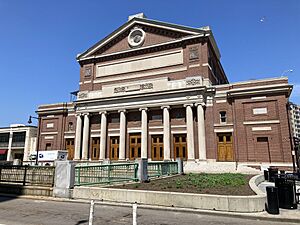
The orchestra became even more famous under Serge Koussevitzky. He was the music director from 1924 to 1949. In 1926, the BSO was the first orchestra to perform a live concert on the radio. Millions of people listened!
Koussevitzky also started the orchestra's summer home at Tanglewood. He founded the Tanglewood Music Center there. This is a special place where young musicians can learn. The BSO still broadcasts its concerts on the radio today.
Koussevitzky also asked many famous composers to write new music for the orchestra. These included Sergei Prokofiev and Igor Stravinsky. He also helped bring to life Béla Bartók's famous Concerto for Orchestra.
After Koussevitzky, Charles Munch became the music director in 1949. He led the orchestra until 1962. Munch took the BSO on its first tour outside the United States. He also made their first stereo recording in 1954. In 1952, Munch hired Doriot Anthony Dwyer. She was the first woman to hold a main position in a major U.S. orchestra.
Later Leaders: Leinsdorf, Steinberg, and Ozawa
Erich Leinsdorf was the music director from 1962 to 1969. Then William Steinberg led the orchestra from 1969 to 1972. After Steinberg, Seiji Ozawa became the music director in 1973. He stayed in this role until 2002. This was the longest time any conductor had led the BSO.
In 1979, Ozawa led the BSO on a special trip to China. This was to celebrate new friendly relations between the United States and China. It was only the second American orchestra to visit the country.
During Ozawa's time, there were some disagreements about his leadership. Some musicians and faculty at Tanglewood had concerns about changes he made. However, others felt that Tanglewood became more exciting under his direction. Ozawa left the BSO in 2002 to lead the Vienna State Opera.
Levine and Nelsons: The Modern Era
In 2004, James Levine became the BSO's music director. He was the first American-born conductor to hold this position. Levine was praised for bringing new energy to the orchestra. He also introduced many new pieces by modern composers. However, Levine had health problems. He resigned from his role in 2011.
After Levine, Andris Nelsons became the 15th music director of the BSO. He first conducted the orchestra in 2011. Nelsons officially started his role in the 2014–2015 season. His contract has been extended several times. He is still the music director today. In 2015, the BSO started a special partnership with the Leipzig Gewandhaus Orchestra in Germany. Nelsons also leads that orchestra.
Fair Pay Lawsuit
In 2018, the BSO's main flutist, Elizabeth Rowe, filed a lawsuit. She said she was paid less than a male musician in a similar role. She believed this was unfair because of her gender. The case was settled out of court in 2019. This means they reached an agreement without going to trial.
Recent Events
In 2020, the BSO had to cancel its tour to Asia. This was because of the COVID-19 pandemic. Many other events were also cancelled, including the 2020 Tanglewood summer festival. The orchestra also had to make changes to its staff and musician pay.
In 2021, Gail Samuel became the first woman president and CEO of the BSO. She resigned in 2023. Chad Smith was appointed as the new president and CEO in the autumn of 2023.
Other Musical Groups
The BSO has other musical groups that are part of it:
- The Boston Pops was started in 1885. This group plays lighter, more popular classical music and show tunes. Arthur Fiedler made the Boston Pops very famous. Later, film composer John Williams led the Pops. Since 1995, Keith Lockhart has been the conductor.
- The Boston Symphony Chamber Players started in 1964. This is a smaller group made up of the main musicians from the BSO. They perform chamber music in Boston and around the world.
- The Tanglewood Festival Chorus sings with the BSO and Boston Pops. This group has over 300 volunteer singers. It was started in 1970 by John Oliver. In 2018, the Boston Symphony Children's Choir was also founded.
Recordings and Film Music
The Boston Symphony Orchestra has a long history of making recordings. Their first recordings were made in 1917. They recorded pieces by composers like Pyotr Ilyich Tchaikovsky. Under Serge Koussevitzky, they made their first electrical recordings in the late 1920s. These included Maurice Ravel's Boléro.
Later, under Charles Munch, the orchestra began making stereo recordings. They have recorded for many different music labels over the years. These include RCA Victor, Deutsche Grammophon, and Philips. Famous conductors like Leonard Bernstein and Bernard Haitink have also made recordings with the BSO.
The BSO has also recorded music for movies. They played the scores for films like Schindler's List and Saving Private Ryan. Both of these were composed by John Williams.
More recently, the BSO started its own recording label called BSO Classics. They release live concert performances. In 2015, the BSO began a new partnership with Deutsche Grammophon. They are recording all of Dmitri Shostakovich's symphonies with Andris Nelsons. Their recording of Shostakovich's Tenth Symphony won a Grammy Award.
Music Directors of the BSO
- George Henschel (1881–1884)
- Wilhelm Gericke (1884–1889)
- Arthur Nikisch (1889–1893)
- Emil Paur (1893–1898)
- Wilhelm Gericke (1898–1906)
- Karl Muck (1906–1908)
- Max Fiedler (1908–1912)
- Karl Muck (1912–1918)
- Henri Rabaud (1918–1919)
- Pierre Monteux (1919–1924)
- Serge Koussevitzky (1924–1949)
- Charles Munch (1949–1962)
- Erich Leinsdorf (1962–1969)
- William Steinberg (1969–1972)
- Seiji Ozawa (1973–2002)
- James Levine (2004–2011)
- Andris Nelsons (2014–present)
Composer Chair
- 1980–1993 John Williams
- 2024–2027 Carlos Simon
See also
 In Spanish: Orquesta Sinfónica de Boston para niños
In Spanish: Orquesta Sinfónica de Boston para niños
- Category:Music commissioned by the Boston Symphony Orchestra (0)
- Richard Burgin, concertmaster of the BSO from 1920 to 1962
- Joseph Silverstein, concertmaster of the BSO from 1962 to 1984
- Malcolm Lowe, concertmaster of the BSO from 1984 to 2019
 | Shirley Ann Jackson |
 | Garett Morgan |
 | J. Ernest Wilkins Jr. |
 | Elijah McCoy |


